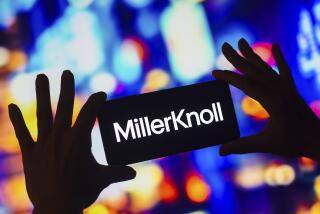Chiron CEO Received No Bonus in 2004
- Share via
The chief executive of Chiron Corp., the company that caused the flu vaccine shortage, received no bonus in 2004, according to a regulatory filing Tuesday.
Howard H. Pien’s salary for 2004 wasn’t disclosed. The company revealed, however, that Pien’s base pay for 2005 would be $850,000, 54% more than his salary in 2003.
For the record:
12:00 a.m. March 19, 2005 For The Record
Los Angeles Times Saturday March 19, 2005 Home Edition Main News Part A Page 2 National Desk 2 inches; 79 words Type of Material: Correction
Chiron executive -- An article in Wednesday’s Business section about the compensation paid to Chiron Corp. Chief Executive Howard Pien said that he joined Chiron in April 2003 and that his base salary increased 54% between 2003 and 2005. To clarify, because Pien’s 2003 salary of $552,461 was for only nine months, he was paid that year at an annual rate of $736,615. On an annualized basis, his 2005 salary of $850,000 was 15% more than his 2003 salary.
“If he didn’t get a bonus, they should not be increasing his base pay,” said Nell Minow of Corporate Library, a research firm.
Half of Chiron’s directors, Minow noted, are present or former employees of Chiron or Novartis, a Swiss drug company that owns a controlling stake in the Bay Area firm. “It is not surprising to find that independent oversight is limited,” she said.
Alison Marquiss, a spokeswoman for Emeryville-based Chiron, said the company would disclose the board’s rationale for Pien’s salary, along with the CEO’s 2004 pay package, in its proxy filing next month. Pien volunteered to give up his bonus, she said.
Pien joined Chiron in April 2003. In addition to salary, he received a bonus of $1.5 million in 2003.
Chiron’s compensation committee is headed by former Eli Lilly & Co. CEO Vaughn Bryson, who could not be reached. Chiron maintains that the members of that committee are independent under rules established by Nasdaq.
David Leach, managing director of ECG Advisors, a Los Angeles consulting firm, said that, unlike Chiron, many companies were limiting increases in executive salaries to hold down fixed costs. Many benefits, such as retirement plans, are linked to salary, Leach noted.
“We are not seeing salaries go up,” he said. Instead, companies are using stock options and bonuses to reward executives for their performance, he said.
Chiron started producing flu vaccine this month after regulators in Britain lifted a five-month suspension of operations at the company’s factory in Liverpool, England. Half the flu shots headed to the U.S. market were lost in October when authorities shut the plant after finding evidence of contaminated vaccine.
The company is under investigation by the Securities and Exchange Commission and the Justice Department for matters related to the shutdown of its Liverpool plant. Chiron also is being sued by shareholders.
Chiron shares fell 85 cents to $36.49 on Nasdaq.
More to Read
Inside the business of entertainment
The Wide Shot brings you news, analysis and insights on everything from streaming wars to production — and what it all means for the future.
You may occasionally receive promotional content from the Los Angeles Times.







